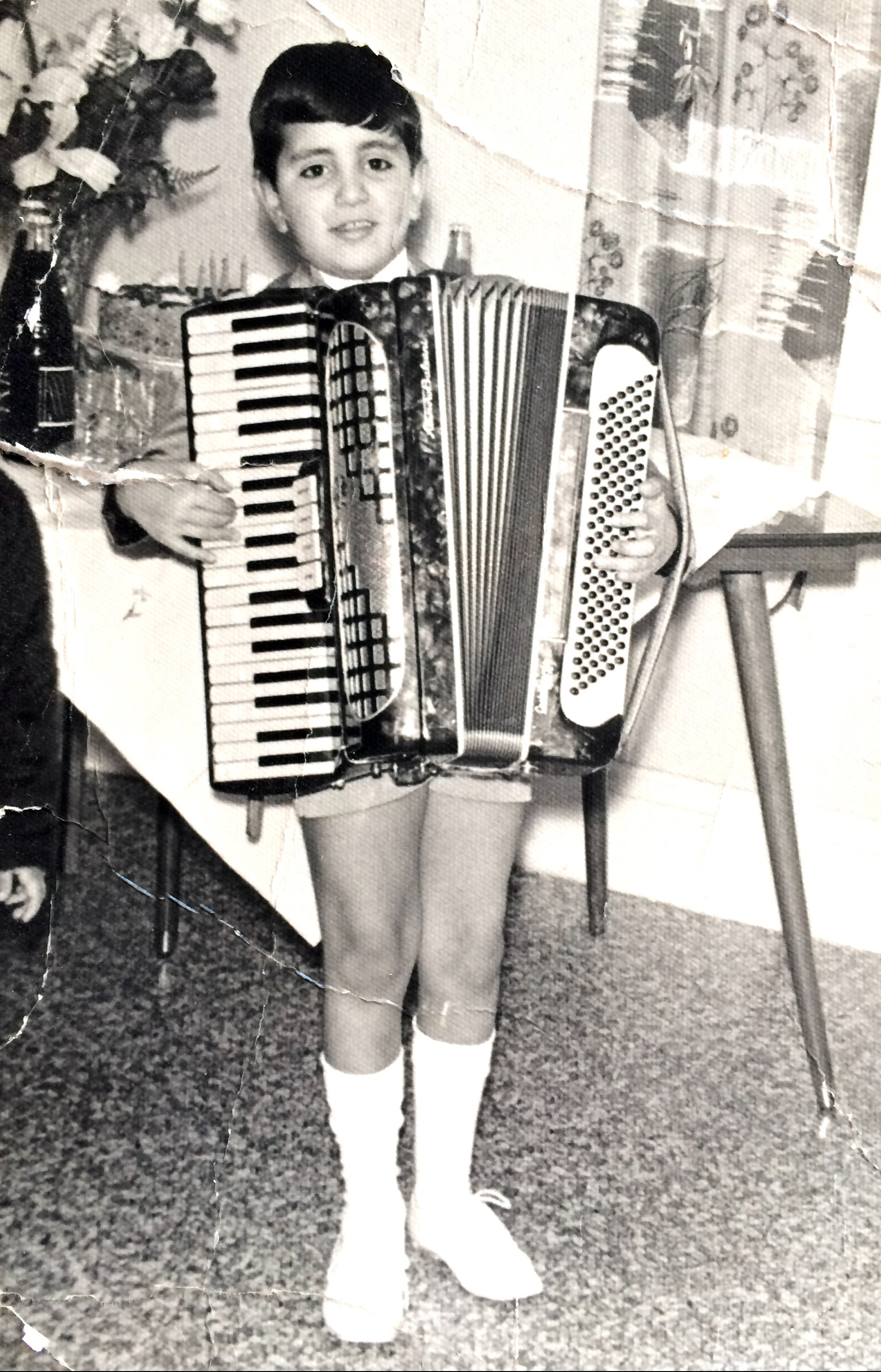The musician brings his own unique style to whatever genre he tries his hand at, imbuing each piece with profound emotions.
With 23 albums to his name – many of which have graced the charts -, multiple collaborations with virtuoso violinist Zoë Black, countless world tours and a plethora of awards, Chindamo feels honoured to receive the Order of Australia.
“This is the beginning of a new chapter,” he says.
“Receiving an award like this pushes you to strive higher and discover new avenues.”
The eldest son of Pasquale and Gerarda, who were both born in the Calabrian town of Laureana di Borrello, Chindamo remembers his childhood in Fitzroy fondly.
“My parents lived about 500 metres from one another in Italy,” he says.
“They only met one another once they had both moved to Melbourne.”
It was obvious that, from a young age, Chindamo was free-spirited and had an artistic disposition.
“I hated my first day at school so much,” he recalls.
“I ran away and went home!
“I had spent the first five years of my life surrounded by Italian family and friends, and then felt suddenly displaced by this new environment.
“My mother took me back to school right away; I think that was the first sign of my free-spiritedness.”
Growing up as a first-generation Italo-Australian, Chindamo remembers feeling the need to repay his parents for all their sacrifices – a sentiment shared by so many of his peers.
This feeling, driven by a desire to free migrant parents from their memories of war and poverty, manifested in an expectation that “we would be their saviours by becoming doctors, lawyers and engineers”.
Such a path is difficult to follow however, when your passion for music supersedes everything else.
“Music is a vocation,” Chindamo says.
“It chooses you, you don’t choose it.”
The musician learned how to become “a person of integrity” by observing his parents, and understanding the sacrifices they made.
His father worked tirelessly as a fruit and vegetable seller at Queen Victoria Market, while his mother was instrumental in shaping Chindamo’s career.
“When I was five years old, I remember being fascinated by this little accordion my uncle kept in his house,” he says.
“My mother asked if she could buy it off him for me, and my uncle said: ‘I’ll give it to you if Joe becomes a good musician’.
“My mother, who was an incredibly smart, driven and funny woman, helped me with musical notation and found me an accordion teacher by the name of Paolo Pergolese.
“After two years, I started lessons with Donato Marcianò, who was an incredibly encouraging and caring teacher.”

Chindamo with an accordion, which was the first instrument he learned to play
Chindamo soon became part of the ‘Marinaretti Italiani’ group, founded by Marcianò, and went on to win numerous ‘La Fiera Italiana’ competitions.
He then participated in the talent show New Faces, showcasing musical diversity as a lone accordionist.
At age 14, Chindamo began performing at events and private functions as a young professional.
“At home, we had these little 45s of Claudio Villa, Gianni Morandi, Al Bano and Romina,” he says.
“I loved their music but I always questioned what went into creating a great song, what components formed the bigger picture.
“Years later, I discovered that Ennio Morricone arranged many of those songs at the start of his career.
“When I was 15 years old, I became fascinated with jazz due to its harmonic complexity.
“I bought my first album, Eumir Deodato de Almeida’s jazz-funky version of Richard Strauss’ Also Sprach Zarathustra, which was on the soundtrack of the film Being There.
“In that moment, I began to understand jazz, but knew I needed to become a pianist.”
While finishing his high school studies, Chindamo started to teach himself the electric organ, practising in his spare time.
He began working for the local impresario, Denis Farrington, who, every Saturday night, had about 40 playing across the Melbourne club scene.
Though Chindamo was deeply passionate about music, he admits that he “was lost in the world of music” and advises others to be “careful what they wish for”.
“I wanted to buy a piano with my earnings,” he recalls.
“I remember fighting with my father and being in tears, as he was so against it.
“He was an extremely hard worker.
“He told me that on one of those sweltering days, he didn’t even have enough money to buy a Coca-Cola, because he had to pay for my music lessons.
“He was trying to show me how much my passion cost.”
Even when confronted by uncertainty and confusion, Chindamo’s determination won out, and he began to study music at the Melbourne State College, which is now part of the University of Melbourne.
He met the entry requirements due to his exemplary score in mathematics, and enrolled in the science faculty, undertaking a probationary period in music.
“I was already performing at the time, but everything I’d learned had been in Italian,” Chindamo explains.
“At the audition, I didn’t even know how to say ‘quaver’ in English!
“I didn’t go to my classes half the time and used to study for my exams the night before.
“I just used to practise piano all day.”
When Chindamo was 20 years old, he began to compose soundtracks and work on television as a pianist, and gained recognition in the industry.
In 1989, he was discovered by Billy Cobham during his tour of Australia and invited to join him for the rest of his performances around the world.
“During that tour, I discovered that Cobham had been the drummer on the first album I’d ever bought,” Chindamo says.
“He paved the way to jazz for me.”
After a stint at the San Pietro a Majella Conservatory in Naples to further hone his skills, Chindamo started performing in Australian jazz festivals in 2001.
“It was as if jazz was this little ring, and I would add diamonds to it,”
“Only, there wasn’t enough space to fit all of them.
“In any art form, you yourself are the only limit.
“But after several ARIA Music Award nominations and no victory, I was tired.
“The world of jazz can be very small; I still like the genre, but I’m not married to it.”
Chindamo soon met violinist Zoë Black and began to reimagine the boundaries of both jazz and classical music.
The duo performed at Carnegie Hall and their fresh approach to the overlap between the two genres resulted in four albums: Reimaginings, Dido’s Lament, The New Goldberg Variations and Symbiosis.
With a stellar 52-years of experience in the industry, Chindamo decided to turn to symphonic composition, creating music for the Australian Chamber Orchestra, the Australian String Quartet, Queensland’s Chamber Orchestra, Melbourne’s Chamber Orchestra, and the Symphony Orchestras of Adelaide, Tasmania and Queensland.
“I felt like this was pre-destined for me,” he says.
“I was better at it than anyone thought I could be – even than I thought I would be.
“To receive an Order of Australa is a huge privilege for anyone, as it validates their life’s work.
“But for the son of Italian migrants, who began his journey on such a humble instrument in a working class suburb in the 1960s, such a seemingly impossible honour validates not only my work, but also the efforts of my parents and our community.
“This makes me so very proud.”












